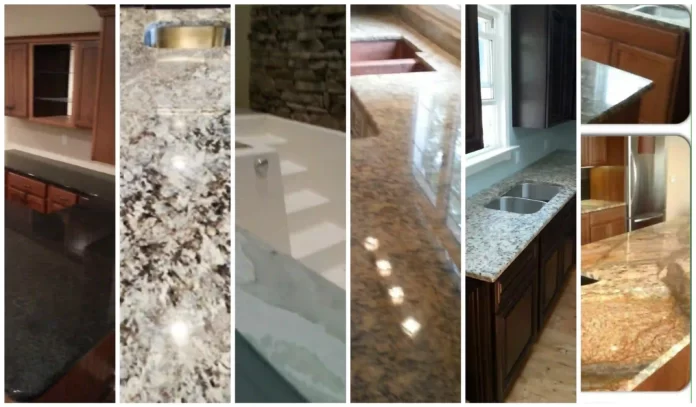In the UK, selecting the perfect material for home renovations like kitchen countertops, flooring, or bathroom fixtures can be a challenging decision. Marble, granite, and quartz stand out as the top choices, each with unique features and benefits. This detailed guide compares these materials across various factors, helping UK homeowners make an informed decision suited to their needs.
What is Marble?
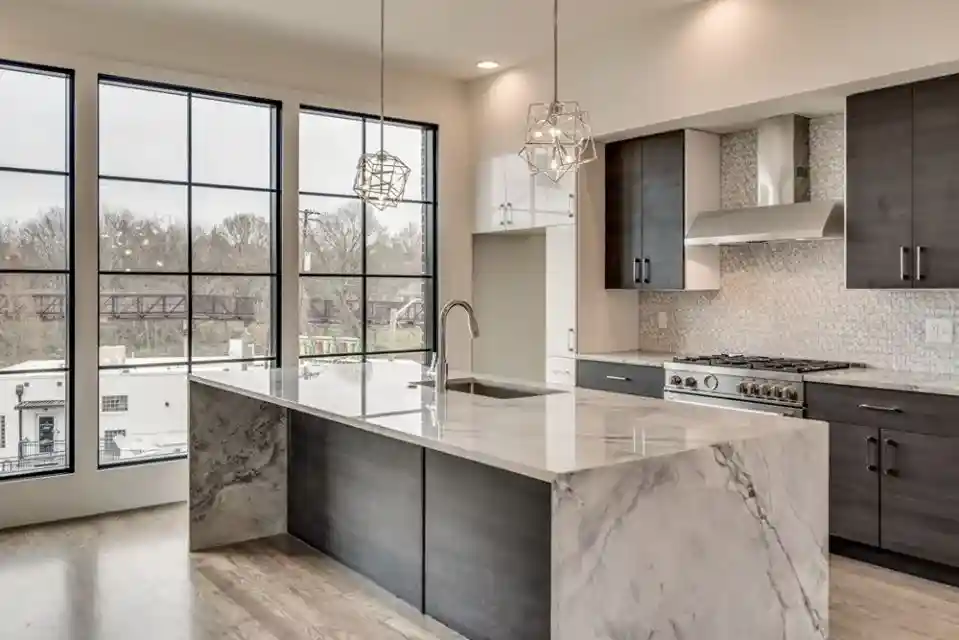
Marble is a fancy natural stone made when limestone is heated and pressed. It’s known for its special lines and a wide range of colors, like classic whites, creams, bold blacks, and greens. Since it comes from nature, every piece of marble is one-of-a-kind, making it really special for decorating inside homes.
What is Granite?
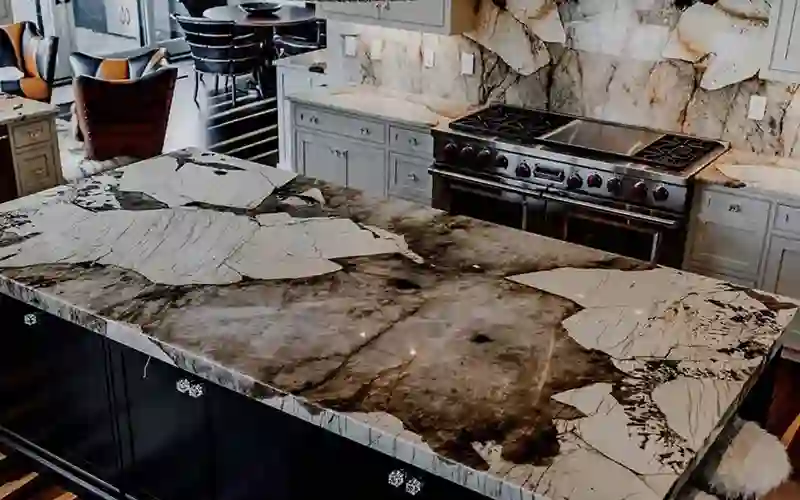
Granite, another natural stone, is an igneous rock composed of quartz, feldspar, and mica. It’s known for its toughness, resistance to wear and tear, and the diversity in its appearance. Granite is available in lots of different colours and designs. Every slab is unique, with little dots and twists that make it look lively and interesting.
What is Quartz?
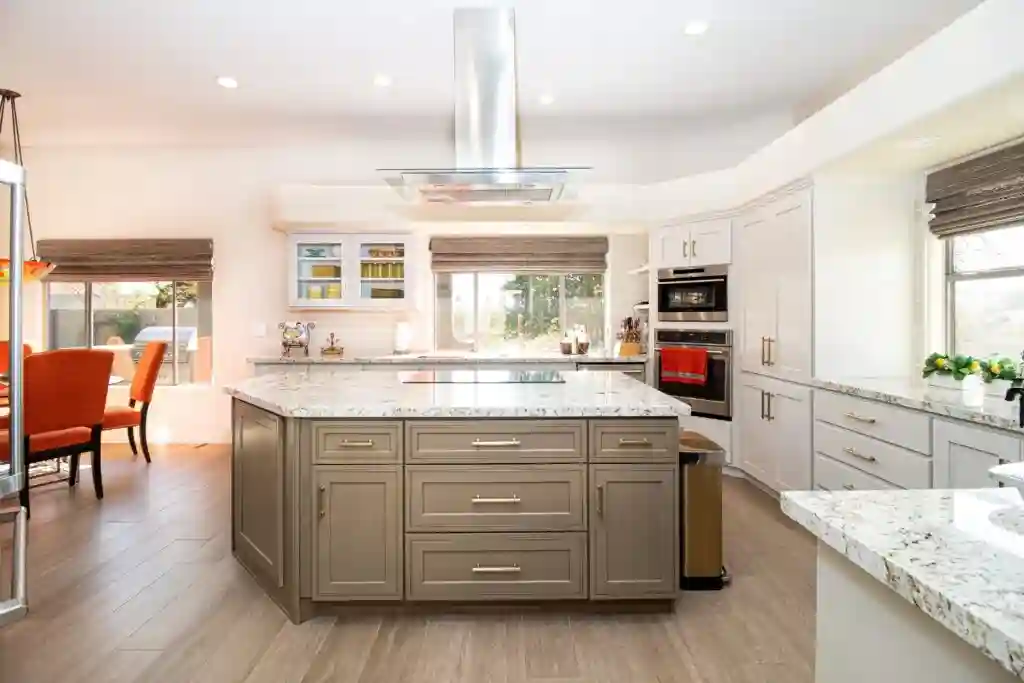
Quartz countertops are a man-made product, created from natural quartz (one of the hardest minerals) combined with resins and pigments. It makes a really strong, smooth surface that comes in lots of colours and styles, even ones that look like real stone.
Marble vs Granite vs Quartz – The Key Differences
1. Cost: Quartz, Marble and Granite
Marble: Its luxury status makes it generally the most expensive option. Prices can vary greatly based on the type and source of the marble.
Granite: Typically more affordable than marble, but rare patterns and colors can be similarly priced. The cost can also depend on the thickness and finish of the slab.
Quartz: Usually falls in the mid-price range, offering a balance between affordability and luxury. Quartz prices remain relatively stable and predictable.
2. Durability
Marble: While durable, marble is softer than granite and quartz. It can scratch and chip more easily and is prone to etching from acidic substances.
Granite: Known for its hardness, granite is highly resistant to scratches and chips. Its robust nature makes it a popular choice for high-traffic areas.
Quartz: Engineered to be tough, quartz is resistant to cracking, chipping, and staining, making it a practical choice for busy kitchens and bathrooms.
3. Water-Resistance
Marble: It can get stained and damaged by water easily because it’s not good at keeping liquids out. To keep it safe from water, you need to apply a protective seal regularly.
Granite: Naturally porous but less so than marble. Sealing granite countertops helps protect against stains and water damage.
Quartz: Being non-porous, quartz doesn’t require sealing. It’s highly resistant to staining and water damage, making it an excellent choice for areas prone to spills.
4. Heat-Resistance
Marble: Good heat resistance but can suffer damage from extreme temperatures or hot pots and pans.
Granite: Exceptional heat resistance, often chosen for kitchens where hot items are placed directly on the surface.
Quartz: Less heat resistant than natural stone. Prolonged exposure to high temperatures can cause damage, so it’s recommended to use trivets or hot pads.
5. Installation
Marble: Requires professional installation due to its weight and the need for precise cutting. The installation process can be costly and time-consuming.
Granite: Similarly heavy and requires professional installation. The complexity of the installation can vary based on the layout and design.
Quartz: Easier to handle than natural stone but still requires professional installation. Its flexibility in design can simplify the installation process.
6. Versatility and Aesthetics
Marble: Ideal for creating a statement piece, often used in bathrooms and as decorative elements. Its unique patterns and colors add an element of luxury.
Granite: Highly versatile, used in various applications from kitchen countertops to outdoor settings. Its natural look fits both traditional and modern designs.
Quartz: Offers design versatility, available in patterns and colors that can mimic the look of natural stone. Widely used in both residential and commercial spaces for its uniform appearance.
Caring for Your Stone Surfaces
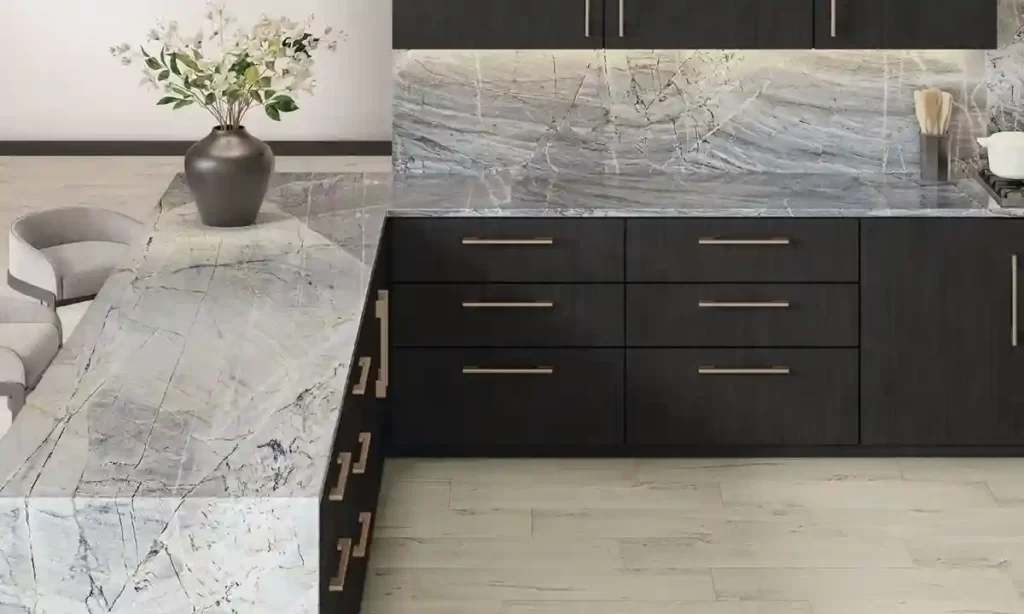
Marble Care
- Regular sealing is essential to protect against stains and etching.
- Use pH-neutral cleaners and avoid acidic or abrasive cleaning products.
- Wipe spills immediately, especially acidic substances like wine or lemon juice.
Granite Care
- Requires periodic sealing to maintain its stain-resistant properties.
- Clean with mild soap and water; avoid harsh chemicals.
- Resealing every 1-2 years is recommended to preserve its natural beauty.
Quartz Care
- Low maintenance, with no need for sealing.
- Easy to clean with just soap and water.
- Avoid exposure to high heat and direct sunlight to prevent discoloration.
Which Material Suits Which Purpose?
Marble: Best for accent pieces and areas where aesthetics are prioritized over functionality. Ideal for bathroom vanities, backsplashes, and decorative elements.
Granite: Great for kitchen countertops, flooring, and high-traffic areas where durability is key. Its natural beauty enhances both traditional and contemporary spaces.
Quartz: Perfect for busy kitchens and bathrooms where low maintenance and durability are important. Its versatility makes it suitable for various design styles.
Conclusion
When considering granite or marble or quartz for your home, it’s important to weigh factors like cost, durability, maintenance, and aesthetic preferences. Each material has its unique advantages, making it suited for different applications. By understanding these differences, you can choose the best option for your specific needs and lifestyle.
FAQs
Q: Which is more expensive, marble, granite, or quartz?
Usually, marble tends to be the most expensive because it looks luxurious and has special patterns. Granite might cost less than marble, especially in more usual colors and designs. Quartz usually has a middle-range price, making it a good choice for those who want something that looks like natural stone but at a more reasonable cost.
Q: Do marble countertops increase home value?
Yes, marble countertops can increase home value due to their luxurious and high-end appearance. They are often sought after in the real estate market for their elegance and timeless beauty, making them a worthwhile investment for home renovations.
Q: How often do granite countertops need to be sealed?
Granite countertops should generally be sealed once a year, but this can vary depending on the usage and type of granite. Regular sealing helps maintain their resistance to stains and prolongs their lifespan.
Q: Can quartz countertops be damaged by heat?
Yes, quartz countertops can be damaged by excessive heat. It’s recommended to use trivets or hot pads when placing hot items on quartz surfaces to prevent heat damage or discoloration.
Q6: Is marble suitable for high-traffic areas?
Marble is not typically recommended for high-traffic areas due to its softer nature and susceptibility to scratching, staining, and etching. It’s better suited for areas where aesthetic appeal is prioritized over heavy use, like bathroom vanities or decorative accents.
Q: How does the maintenance of marble compare to granite and quartz?
Marble requires more maintenance compared to granite and quartz. It needs regular sealing and careful cleaning to prevent staining and etching. Granite requires less frequent sealing but still needs care to maintain its finish. Quartz is the easiest to maintain, requiring no sealing and simple cleaning with soap and water.
Q: Which material offers the widest range of colors and patterns?
Quartz offers the widest range of colours and patterns, as it can be engineered to mimic the look of natural stones like marble and granite, along with unique colors and designs not found in nature.

